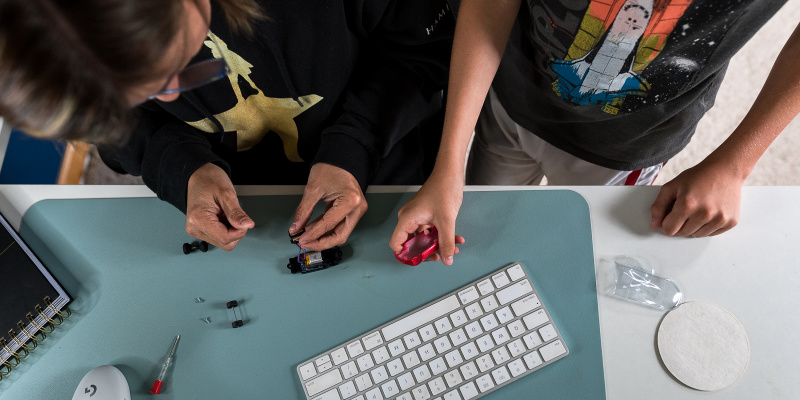Nurturing a Strength-Based Approach to Learning in Homeschooling
Strengths-based learning can play a crucial role in crafting your child’s educational journey. Understanding the distinctions between a strengths-based and a deficits-based approach to education is important, underscoring the importance of acknowledging and fostering your child’s unique strengths, talents, and abilities.

Understanding Strengths-Based Learning
So what are the fundamental distinctions between a strengths-based approach and a deficits-based approach to education? In a strengths-based education model, the focus is on identifying and nurturing the individual strengths of children, building on what they excel at, and leveraging their positive attributes to enhance learning and development. This approach encourages positive reinforcement, celebrating achievements, and creating an environment where children feel valued and empowered.
On the other hand, the deficits-based approach, entrenched in traditional education models, tends to concentrate on identifying and addressing children’s weaknesses, emphasizing remediation and intervention to overcome perceived shortcomings. The deficits-based approach often leads to a focus on correction and remediation strategies rather than celebrating a child’s natural proficiencies and talents.
Benefits of a Strengths-Based Approach
There are profound advantages to adopting a strengths-based approach to education, including the positive impact it can have on your kiddo’s motivation, self-esteem, and overall well-being. By emphasizing their strengths, children can experience increased motivation and engagement in the learning process, which, in turn, boosts their confidence and self-awareness.
A strengths-based approach also allows for a more personalized and individualized learning environment where each child’s unique strengths and interests are supported and fostered. Moreover, it encourages a growth mindset, teaching children to view challenges as opportunities for growth and development, leading to enhanced resilience and a positive attitude towards learning.
Implementing a Strengths-Based Approach in Homeschooling
To implement a strengths-based approach in your homeschool, several strategies can be integrated to create a supportive and empowering educational experience for children. Identifying and celebrating strengths is a crucial starting point, as you can observe and acknowledge the diverse strengths of each child, whether they are academic, artistic, athletic, or social, and create opportunities for children to shine and receive recognition for their abilities.

In addition to celebrating strengths, individualizing the teaching approach for each child is essential. Tailoring curriculum choices and activities to align with a child’s interests and strengths allows for a more engaging and effective learning experience. Furthermore, fostering a positive learning environment through open communication, constructive feedback, and encouraging a growth mindset can help children develop resilience and a willingness to tackle challenges.
Empowering your kids to pursue passion projects and providing opportunities for them to share their knowledge with others fosters collaboration and reinforces their strengths. Offering choices in the learning process, incorporating real-world applications, and modeling a positive attitude towards learning can further promote a strengths-based approach in homeschooling.
Building a Lifelong Love of Learning
By nurturing a strengths-based approach in homeschooling, parents can create an environment that not only supports academic growth but also fosters a positive mindset and a lifelong love of learning in their children. This approach not only prepares children for academic success but also contributes to their overall well-being and personal development, instilling confidence and a strong sense of self-worth that sets the stage for long-term success.
By celebrating and nurturing children’s strengths, parents and educators can create a supportive and empowering educational environment that fosters resilience, confidence, and a passion for learning, laying a strong foundation for your children’s future success.

RLL #223: Nurturing a Strength-Based Approach to Learning in Homeschooling
In this week’s episode, we dive into the importance of fostering a strengths-based approach to learning and teaching our kids. Here are some key takeaways from the episode:
- A strengths-based approach focuses on identifying and nurturing the individual strengths, talents, and abilities of our kids, while the traditional deficits-based approach tends to concentrate on addressing weaknesses and learning difficulties.
- By celebrating achievements and reinforcing positive behaviors, a strengths-based approach creates an environment that empowers children and builds their confidence and self-esteem.
This approach fosters a more personalized and individualized learning environment, allowing children to view challenges as opportunities for growth and resilience.
We also share practical strategies for cultivating a strengths-based approach within your homeschool, including identifying and celebrating strengths, tailoring curriculum choices to align with your child’s interests, and fostering a positive learning environment through open communication and constructive feedback.
We want to hear from you! Share the strategies you use to capitalize on your kiddo’s strengths and foster a strengths-based learning approach within your own home. You can send us an email or leave a voicemail message using the widget below.
Links and Resources from Today’s Show
- SPONSOR|CTC Math
- Raising Lifelong Learners Membership Community – The Learners Lab
- Masterclass | Raising Resilient Families
- Bundle | Smart Boy Characters Movie Studies
- Bundle | Smart Girl Characters Movie Studies
- Raising Resilient Sons by Colleen Kessler, M.Ed.
- What’s The Difference Between Interest-Led and Strength Based Learning?
- RLL #67: Ideas for Nurturing Our Kids’ Strengths
- RLL #66: Strength-Based Learning for Differently-Wired Kids with Shawna Wingert
- RLL 17 Shawna Wingert: Building on Your Child’s Strengths
- Strength Finder Worksheet (free download)
- The Powerful Relationship Between Confidence And Learning In Our Homeschools
- Building Self-Esteem in Kids
- RLL 30 Andrew Peterson: Being Students of Our Children
- RLL #40: Self-Directed Homeschooling High School with Trevor Kessler
- What Interest-Led Learning Really Looks Like by Shawna Wingert
- Different by Design Learning: Strength Based Learning Plan Workbook
Leave a Rating or Review
Doing so helps me get the word out about the podcast. iTunes bases their search results on positive ratings, so it really does help — and it’s easy!
-
- Click THIS link to go to the podcast main page.
- Click on View in iTunes under the podcast cover artwork.
- Once your iTunes has launched and you are on the podcast page, click on Ratings and Review under the podcast name. There you can leave either or both! Thanks so much.

